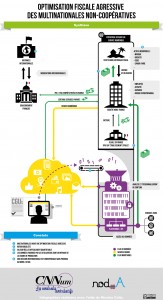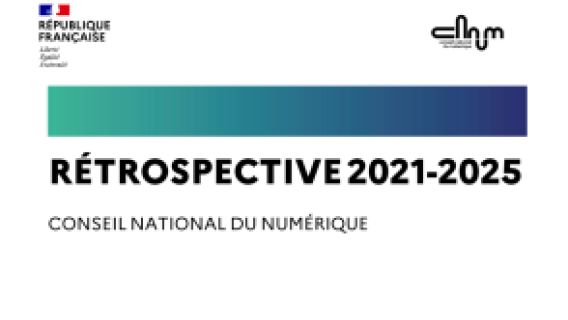Opinion on the taxation of the digital economy
The Conseil National du Numérique (French Digital Council) delivered its conclusions on the taxation of the digital economy to Fleur PELLERIN, Delegated Minister to the Small and Medium-Sized Companies, to the Innovation and to the Digital Economy, as well as to Bernard CAZENEUVE, Delegated Minister charged of the Budget.
Voted by the members of the CNNum, the opinion is accompanied by a report containing a restitution of the concertation organized since the month of March, piloted by Godefroy BEAUVALLET, Vice-President of the CNNum, organized around contributive meetings, gathering more than 120 people, with among them elected officials, directors of companies and startups, professional federations, lawyers, independent administrative authorities, administration, experts and researchers.
At the end of this work, the CNNum voted an opinion with the following recommendations:
- an immediate initiative at the international and infra-european level
- the strengthening of transparency and of its controls
- to avoid the unilateral and immediate implementation of a national specific tax
- the deployment of an industrial digital european strategy
Opinion and report:
Le rapport accompagnant l'avis
Press (fra):
Lire le dossier de presse remis aux ministres le 10 septembre 2013
According to Godefroy BEAUVALLET, "the international negotiation is running between a side wanting to bring down the advanced social models in place during the digital transformation, and another side searching to reinvent them while preserving their amibition." In particular, the Council doesn't recommend the creation of a sectorial national tax, that could penalize the French ecosystem and to hinder the French position in international negotiations.
If the struggle against tax avoidance of multinational corporations stays a priority, and that it should be started by multiplied controls, the Council urges to solve these stakes by starting a work at the infra-european scale, so that France determines, with its European homologues, a fiscal frame adapted to the digital transformation.
To do this, the Council especially recommends to mobilize the members of the European Union by calling "industrial and public economists, fiscalists and legals experts recognized at the international level."
As such, French ministers announced the organization of an international seminar on the subject in order to prepare the debates and decisions of the 24 and 25 October 2013 European Council dedicated to the digital.
[watch the video of the seminar]
According to Benoit THIEULIN, President of the CNNum, "beyond this, it is essential to forge alliances with countries that, like France, fought hard against aggressive tax avoidance, starting with the United Kingdom and Germany. The task is very large, but not as much as the one that brought the generalization of the French VAT model fourty years ago."
A participative methodology:
The concertation's roadmap
Each of the participants received a roadmap in which were shown questions related to the taxation of the digital economy to which they had to answer and to bring their own contribution: this contribution was a necessary condition for them to participate to the 3 meeting sessions organized by the Council.
They were carefully analyzed and allowed the CNNum to form a more complete picture of the different positions and present power relationships, with which he had to consider, identify the consensus but also the problems that got asked on a regular besis, and thus to build a better informed choice.
Elles ont été soigneusement analysées et ont pu permettre au CNNum de se forger une idée plus complète des différentes positions et rapports de force en présence auxquels il a du tenir compte, identifier les consensus mais aussi les problématiques qui se posaient de manière récurrente, et ainsi construire un choix mieux éclairée
The roadmap is downloadable here (fra)
The 3 contributive Fridays
The concertation has been organized under the shape of 3 contributive Fridays, times of exchanges and of a collective thinking between the members of the Council's workgroup and external personalities chosen for their skills or their involvement on the subject.
The Council wanted to introduced an innovative method : it didn't wanted to conduct hearings, but rather a mode promoting exchange and thinking between stakeholders.
-
The first session was held on April 19 and gathered around fifty guests including Jacques Sasseville from OCDE and the economists Camille Landais (London School of Economics) and Clément Carbonnier (Conseil d'Analyse Economique), who presented to the entire group their approaches on the problems created by the digital regarding the tax system. These presentations were very fulfilling, especially as they extended the knowledge of all on the state of positive law or the current various juridical tools.
-
Nicolas Collin was a guest of the 2nd contributive Friday on May 17, and he was able to present in detail his report Collin Colin on the taxation of the digital economy. This session gathered near 70 participants.
-
The 3rd session on June 21 gathered around fifty people including the representative Laure de la Raudière who presented the problem of the taxation of the digital economy and the implementation of a wholesale pricing at the European level, the representative Philippe Marini and the member of the CNNum Ludovic Bleicher via videoconferencing. This session had in focus the various proposals of taxes poured in public debate.
These various interventions preceding the workshops permitted to set a base on which people could rely. Concertations were organized under the shape of workshops: this division of the guests in several little groups permitted to divide the actors with similar interests in order to facilitate exchange and reflexion.
The structuring of the concertation in time was organized like an hourglass, by going first on a diagnosis, then focusing on the Collin Colin report and finally broaden on other prospective proposals to which the CNNum added its own researches (suggested reports in the contributions, lectures, international benchmark, past examples of tax establishments, etc.)
The Council thanks all the participants to this collective reflexion.
Space of restitution of the concertation phase:
This espace is enriched throughout the concertation process.
19 April session: problems and engaged actions at the international and european level
-
introduction presentations:
- Jacques Sasseville (OCDE - Head of the Tax Treaty Unit of the Fiscal Affairs Division)
- Camille Landais (London School of Economics and Political Science - Economist)
- Clément Carbonnier (Conseil d'analyse économique - Scientific Advisor // University of Cergy-Pontoise - Assistant professor)
- session debriefing
- summary of the main elements exchanged between the stakeholders:
17 May session: the proposals of Pierre Collin and Nicolas Colin following the expertise mission on the taxation of the digital economy
- session debriefing
- highlight pictures of the day
- presentations used in workshops (eng) : here and here
- presentations used in workshops (fra):
|
[caption id="attachment_5248" align="alignnone" width="163"] |
[caption id="attachment_5250" align="alignnone" width="217"] |
|---|
21 June session: the other proposals poured in the public debate



 Aggressive tax avoidance by non-cooperative multinational companies[/caption]
Aggressive tax avoidance by non-cooperative multinational companies[/caption] Modeling of the proposed incitative tax in the gathering and utilization of data[/caption]
Modeling of the proposed incitative tax in the gathering and utilization of data[/caption]

